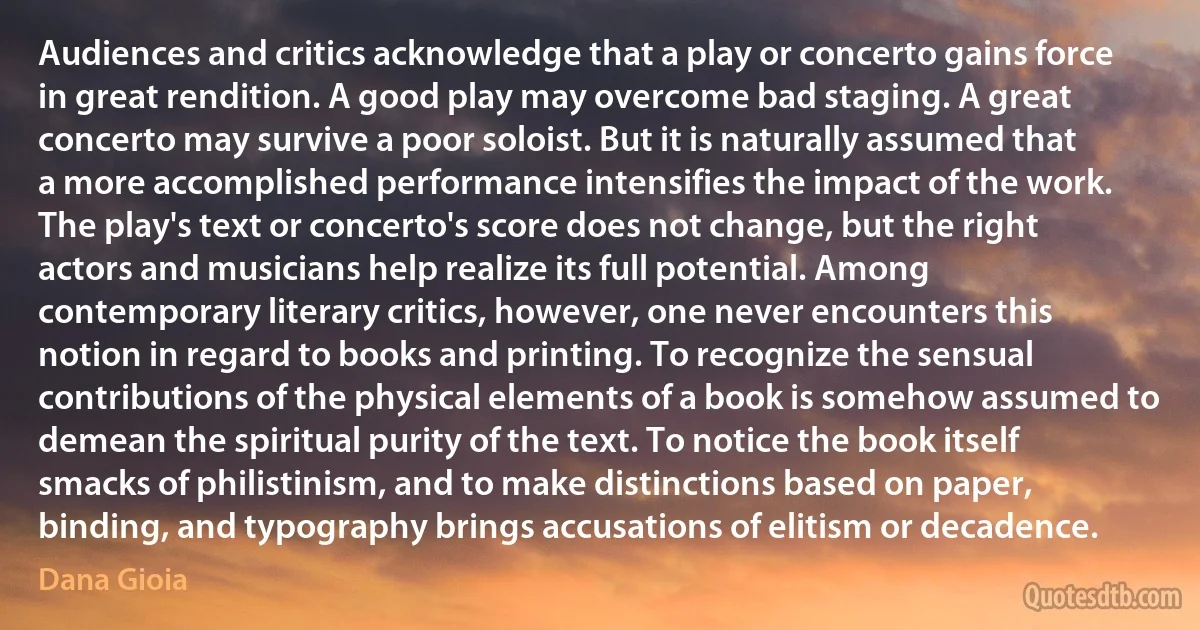
Audiences and critics acknowledge that a play or concerto gains force in great rendition. A good play may overcome bad staging. A great concerto may survive a poor soloist. But it is naturally assumed that a more accomplished performance intensifies the impact of the work. The play's text or concerto's score does not change, but the right actors and musicians help realize its full potential. Among contemporary literary critics, however, one never encounters this notion in regard to books and printing. To recognize the sensual contributions of the physical elements of a book is somehow assumed to demean the spiritual purity of the text. To notice the book itself smacks of philistinism, and to make distinctions based on paper, binding, and typography brings accusations of elitism or decadence.
Dana GioiaRelated topics
bad book change concerto contemporary decadence demean force full good great help notice overcome paper philistinism play poor printing rendition right score soloist staging text typography work elitismRelated quotes
Yes, secularism does propose a physical and purposeless universe, and many (but not all) of us accept the notion that our sense of self is a neuronal illusion. But although the universe is purposeless, our lives aren't. This conflation of a purposeless universe (i.e., one not created for a specific reason) with purposeless human lives is a trick that the faithful use to make atheism seem nihilistic and dark. But we make our own purposes, and they're real. Right now my purpose is to write this piece, and then I'll work on a book, and later I'll have dinner with a friend. Soon I'll go to Poland to visit more friends. Maybe later I'll read a nice book and learn something. Those are real purposes, not illusory purposes to which Douthat wants us to devote our only life.

Jerry Coyne
The prejudices of the second species, since they impose upon the intellect by the sensual conditions restricting the mind if it wishes in certain cases to attain to what is intellectual, lurk more deeply. One of them is that which affects knowledge of quantity, the other that affecting knowledge of qualities generally. The former is: every actual multiplicity can be given numerically, and hence, every infinite quantity; the latter, whatever is impossible contradicts itself. In either of them the concept of time, it is true, does not enter into the very notion of the predicate, nor is it attributed as a qualification to the subject. But yet it serves as a means for forming an idea of the predicate, and thus, being a condition, affects the intellectual concept of the subject to the extent that the latter is only attained by its aid.

Immanuel Kant
I'm aware of the made up declarations about me that have recently begun to appear on the Internet and in emails as "Chuck Norris facts." I've seen some of them. Some are funny. Some are pretty far out. Being more a student of the Wild West than the wild world of the Internet, I'm not quite sure what to make of it. It's quite surprising. I do know that boys will be boys, and I neither take offense nor take these things too seriously. Who knows, maybe these made up one-liners will prompt young people to seek out the real facts as found in my recent autobiographical book, "Against All Odds?" They may even be interested enough to check out my novels set in the Old West, "The Justice Riders," released this month. I'm very proud of these literary efforts.

Chuck Norris
Now let us regard the idea of God from the magic standpoint, according to the four elements,the so-called tetragrammaton, the unspeakable, the supreme: the fiery principle involves the almightiness and the omnipotence, the airy principle owns the wisdom, purity and clarity, from which aspect proceeds the universal lawfulness. Love and eternal life are attributed to the watery principle, and omnipresence, immortality and consequently eternity belong to the earth principle. These four aspects together represent the supreme Godhead. Let us tread upon this path to this supreme Godhead practically and step by step, beginning from the lowest sphere, to arrive at the true realization of God in ourselves. Let us praise the happy man who will reach this still in his earthly existence. Us banish fear of the pains, for all of us will reach this goal.

Franz Bardon
Even the widespread resort to shifting cultivation with burning and light hoeing was not as childish as the first European colonialists supposed. That simple form of agriculture was based on a correct evaluation of the soil potential, which was not as great as initially appears from the heavy vegetation; and when the colonialists started upsetting the thin topsoil the result was disastrous. The above remarks show that when an outsider comes into a new ecological system, even if he is more skilled he does not necessarily function as effectively as those who have familiarized themselves with the environment over centuries; and the newcomer is likely to look more ridiculous if he is too arrogant to realize that he has something to learn from the "natives.”.

Walter Rodney
